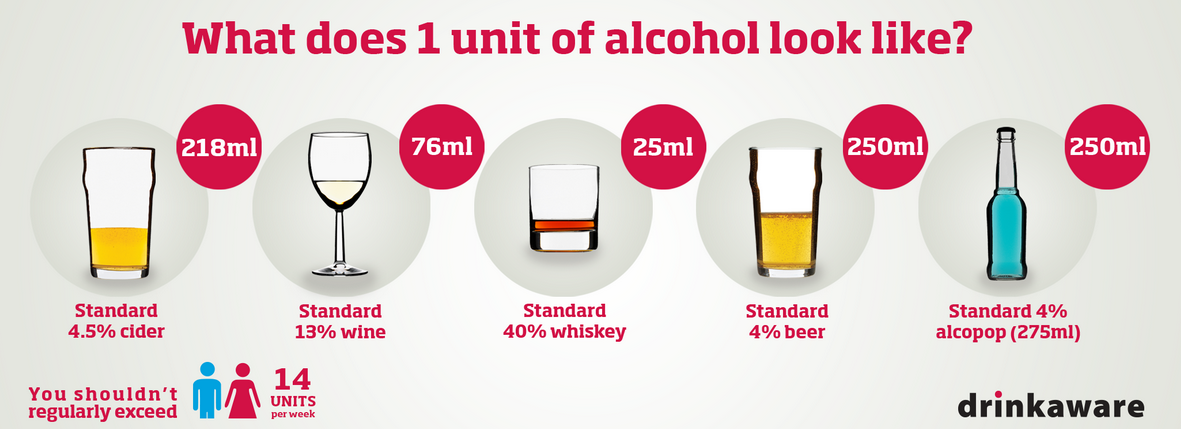Alcohol

Its been a difficult couple of years and research from Drinkaware published on 15 May 2020 found that a third (36%) of furloughed workers are drinking more since lockdown began, compared with 26% of those working from home as a result of the lockdown and 24% of people overall in the UK average.
In times of stress you can find yourself drinking more and more heavily.
If you believe you have an alcohol substance or drug problem, or feel that you may be developing one, then you should seek specialist help as soon as possible by speaking to your GP, treatment services, Line Manager, HR or Occupational Health Service.
If you are struggling with your mental health and are turning to alcohol or drugs to help you to cope we have an excellent Psychology and counselling service that you can self refer to using the following link:
Psychology link:
Realising you have a problem with alcohol is the first big step to getting help.
You may need help if:
- You often feel the need to have a drink
- You get into trouble because of your drinking
- Other people warn you about how much you're drinking
- You think your drinking is causing you problems
You can get help to either cut down and control your drinking or stop completely, and have plans and support to maintain the improvement.
If you have become physically dependent and need to stop drinking completely, stopping overnight could be harmful. You should get advice about this and about any medicine you may need to do this safely. Find alcohol support services in your area
Line Manager advice:
If you are a line Manager and you have any concerns or you are approached by an employee, please
- Have a well-being conversation with the individual of concern.
- Provide signposting to support services and contact HR.
- Consideration should be given to whether the employee is fit to remain at work, or whether they should be sent home from work, recorded as sickness absence.
To support staff well-being, and in the interests of retaining talent and protecting productivity, employees need to feel able to ask for support and know their employer will provide it.
Behind any alcohol or drug problem, there may be personal or work issues that need to be recognised and acknowledged so that assistance can be sought where possible. Without intervention these symptoms can develop into serious long-term health conditions.
If work related stress was highlighted as an issue during your well-being conversation please complete the trust stress risk assessment: Link to stress risk assessment
If an employee is misusing alcohol or drugs they may display some of the following symptoms:
- Mood changes, irritability, lethargy and fatigue from sleeplessness
- Erratic performance
- Overconfidence
- Inappropriate behaviour
- Reduced response times
- Impaired concentration and memory
- Reduced productivity
- Absenteeism, both through sickness, last minute requests for annual leave, lateness and unauthorised absence.
- Deterioration in relationships
- Financial irregularities
- Smelling of alcohol
- Hand tremors, slurred speech, facial blushing, bleary eyes, poor personal hygiene
This list is not exhaustive and there may be other causes for the above symptoms and so it is important not to make assumptions. If you note any of the above we would recommend that you conduct a well-being conversation and identify what support can be provided.
Support:
-
In this Trust staff and managers who wish to discuss any issue surrounding alcohol can contact the Liverpool Community Alcohol Service team (LCAS) on 0151 795 5395 .All calls are in the strictest confidence. Referrals of this nature can also be made through the Occupational Health Service or by emailing lynno@liv.ac.uk.
-
Staff psychology service: LINK
- Alcohol and drug dependency policy: LINK
- https://ymcatogether.org.uk/health-well-being/#rise-recovery
- https://www.merseycare.nhs.uk/our-services/liverpool/liverpool-community-alcohol-service-lcas
- Liverpool Community Alcohol Service team (LCAS) on 0151 795 5395.
Liverpool also has several agencies that can help individuals, and these can be accessed through the following link:
Other services:
Sanctuary Family Support
322-326 Upper Parliament street
Liverpool
L8 7QL
Open 9.00am to 4.30pm
Tel: 0151 735 0747
FRANK
You want to talk, you can call FRANK at: 0300 123 6600 24 hours a day, 365 days a year.
Brook place
If you live in Liverpool and have a problem with using opiates you can be referred to the community drug team at Brook Place:
You can ask your GP or other health professional to refer you or you can refer yourself by attending the team (Orphan Drive, Tuebrook, Liverpool, L6 7UN) Monday to Friday or contacting:
Tel: 0151 330 8260
Fax: 0151 330 8262
Brook Place offers a recovery focused service including:
- Assessment, advice and information
- Recovery focused approach to care planning and delivery
- Psycho-social interventions
- Peer mentors and support
- Substitute prescribing
- Community detoxification programmes and referral for inpatient treatment
- Support and signposting to partnership agencies.
Inpatient service
Mersey care runs the Hope Centre, offering detoxification programmes for those who are unable to detoxify within the community or who have been unsuccessful trying to do so. You cannot self refer however teams at DART or Brook Place can also refer you.
Hope Centre
Smithdown Health Park, Smithdown Road, Liverpool, L15 2HE
Tel: 0151 330 8074
Note to staff other than Liverpool Hospitals staff
Please be aware that these pages are for Liverpool Hospitals staff and whilst general information is widely available to all Trusts who use LUHFT Occupational Health service, you may find that trying to access specific services (other than Occupational Health) is restrictive. If you work in another Trust, and you are unable to access any site specific links, your own Trust may have similar schemes for you to access. Please check your own Intranet





